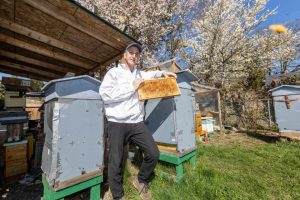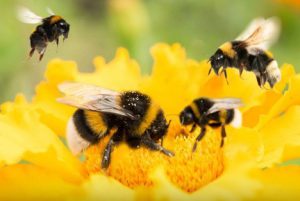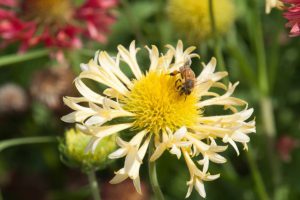Island beekeepers stung by fear of imported honey bees.
Early reports suggest Vancouver Island bees will continue to have a high mortality rate, says provincial apiculturist Paul van Westendorp.

Don Lambert, vice-president of the Capital Regional Beekeepers Association, at his hives.
Don Lambert’s honey bees have made it through the past five winters.
While B.C. beekeepers have suffered devastating losses from disease, parasites and bad weather for more than a decade, a select group of beekeepers on Vancouver Island is doing just fine, said Lambert, the vice-president of the Capital Region Beekeepers Association.
And they want to keep it that way.
“There’s a huge group of people who believe Vancouver Island should have a quarantine,” said Lambert, who has been a beekeeper for 12 years. “We’re importing bees from all over the world. Local beekeepers are importing bees from Tasmania. Are we bringing in unknown viruses? Are we bringing in more critters that shouldn’t be here? There are a lot of questions about that sort of thing.”
A quarantine was imposed in 1988 to protect the bee population on Vancouver Island from other bees on the Canadian mainland. During the quarantine, Vancouver Island beekeepers were allowed to import bees only from foreign suppliers such as New Zealand and Chile. The quarantine was lifted in 2010 despite objections from many Island beekeepers.
Although Lambert and others have been successful getting their bees through the winter, he recognizes that a lot of people lose their hives and the big picture for bee health “is probably not great.”
“What we have got to look at and ask is why are our local bees not thriving,” he said.
Early reports suggest Vancouver Island bees will continue to have a high mortality rate, provincial apiculturist Paul van Westendorp said Wednesday, noting there is an inherent risk overwintering bees in Canada.
Every May, the Ministry of Agriculture surveys large beekeepers to find out how their colonies did over the winter.
The results of the 2022 survey showed beekeepers lost 32 per cent of their hives, similar to what was seen in 2021, said van Westendorp.
Still, B.C. did not fare as badly as other provinces last year. The losses across the country were even higher, he said.
In Ontario, for example, overwinter mortality was 49 per cent in 2021-22, up from 18 per cent the previous year, according to the province’s Ministry of Agriculture, Food and Rural Affairs. Across Canada, the estimated average loss was 46 per cent.
The 2023 survey has not been done and final figures for B.C. won’t be available until late June, but van Westendorp said some early reports suggest high mortality on the Saanich Peninsula and other parts of Vancouver Island.
In the past 20 years, the mortality of honeybee colonies has increased on a year-by-year basis largely because of diseases and pathogens. The most important one affecting is the varroa mite, which feeds on both adult honeybees and larvae and pupae in the developing brood.
“They feed on the body fat and the blood of adult bees. The pressure of parasitism is enough for the bees to start to suffer and the colony weakens,” van Westendorp said.
In addition, a lot of beekeepers do not effectively control the mites, which also transmit viruses that can kill the bees later in the season, said the apiculturist.
“It’s a complicated picture that has made beekeeping a highly complex form of animal husbandry,” he said.
The picture is further complicated by beekeepers importing bees from other parts of the world, he said.
Like Lambert, van Westendorp is concerned about bees being imported from other countries.
Maybe that varroa mite from New Zealand is carrying a virus not seen here. “That is the inherent risk associated with importing bees from elsewhere,” he said…..
To read the complete article go to; Island beekeepers stung by fear of imported bees – Victoria Times Colonist
We are here to share current happenings in the bee industry. Bee Culture gathers and shares articles published by outside sources. For more information about this specific article, please visit the original publish source: Island beekeepers stung by fear of imported bees – Victoria Times Colonist





